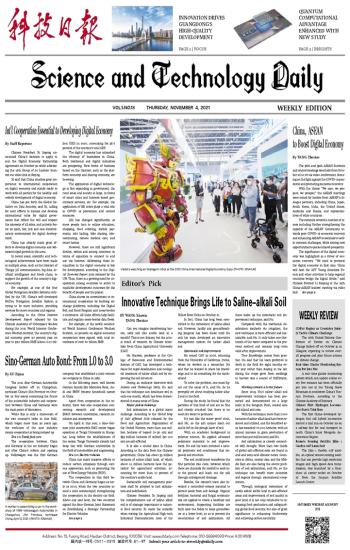
 Innovation Drives Guangdong's High-quality Development
Innovation Drives Guangdong's High-quality Development Quantum Computational Advantage Enhanced with New Study
Quantum Computational Advantage Enhanced with New Study Int'l Cooperation Essential to Developing Digital Economy
Int'l Cooperation Essential to Developing Digital Economy China, ASEAN to Boost Digital Economy
China, ASEAN to Boost Digital Economy Innovative Technique Brings Life to Saline-alkali Soil
Innovative Technique Brings Life to Saline-alkali Soil WEEKLY REVIEW
WEEKLY REVIEW Sino-German Auto Bond: From 1.0 to 3.0
Sino-German Auto Bond: From 1.0 to 3.0 S&T DAILY WECHAT ACCOUNT (EN)
S&T DAILY WECHAT ACCOUNT (EN) PHOTO NEWS
PHOTO NEWS
Chinese President Xi Jinping announced China's decision to apply to join the Digital Economy Partnership Agreement on October 30 while addressing the 16th Group of 20 Leaders' Summit via video link in Beijing.
Xi said that China attaches great importance to international cooperation on digital economy and stands ready to work with all parties for the healthy and orderly development of digital economy.
China has put forth the Global Initiative on Data Security, said Xi, calling for joint efforts to discuss and develop international rules for digital governance that reflect the will and respect the interests of all sides, and actively foster an open, fair, just and non-discriminatory environment for digital development.
China has already made great efforts to develop digital economy and witnessed rapid growth in this area.
In recent years, scientific and technological achievements have been made in multiple areas, such as the Internet of Things, 5G communication, big data, artificial intelligence and block chain, to support the growth of the country's digital economy.
For example, as one of the four Global Navigation Satellite Systems certified by the UN, China's self-developed BeiDou Navigation Satellite System is trying to be more inclusive, providing services for more countries and regions.
According to the China Internet Development Report released by the Chinese Academy of Cyberspace Studies during the 2021 World Internet Conference Wuzhen Summit, the country's digital economy grew 9.7 percent year on year to 39.2 trillion RMB (about 6.07 trillion USD) in 2020, accounting for 38.6 percent of the country's total GDP.
The digital economy has unleashed the vibrancy of businesses in China. Both traditional and digital industries are prospering. New forms of business based on the Internet, such as the platform economy and sharing economy, are booming.
The application of digital technology is fast expanding in government, the rural areas and society at large, in forms of smart cities and Internet-based government services, etc. For example, the application of QR codes plays a vital role in COVID-19 prevention and control measures.
Life has changed significantly, as more people turn to online education, shopping, food ordering, mobile payments, ride hailing, bike sharing, telecommuting, remote medical care, and smart homes.
However, there are still significant divides, within and among countries, in terms of capacities to connect to and use the Internet. Addressing these inequalities in the digital economy is key for development, according to the Digital Economy Report 2021 released by the UN. Thus, there is a growing need for cooperation among countries to arrive to equitable development outcomes for the benefit of people and the planet.
China shows its commitment to international cooperation by building exchange platforms, including the Digital Belt and Road Program and cross-border e-commerce. All these efforts help facilitate and regulate cross-border data flows.
For example, at the newly concluded World Internet Conference Wuzhen Summit, 40 projects on digital economic cooperation were signed, with total investment of over 60 billion RMB.

 Next
Next



